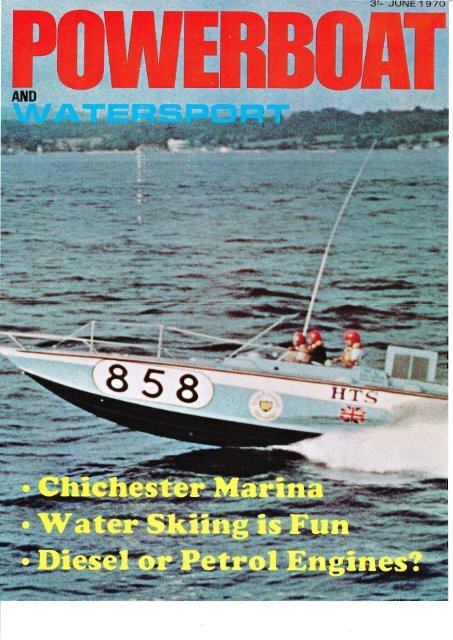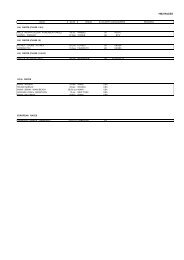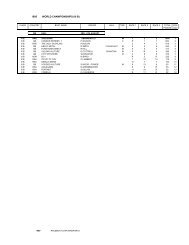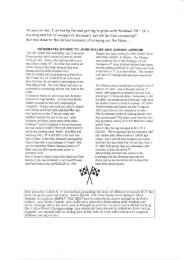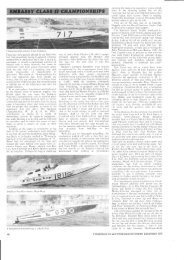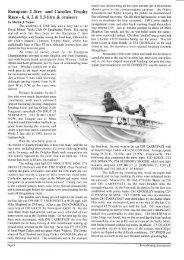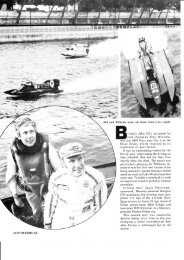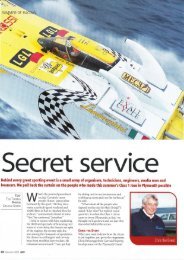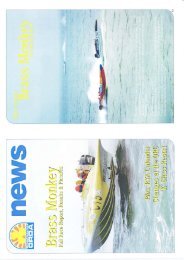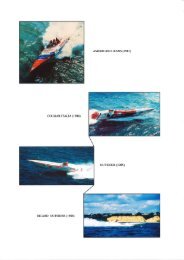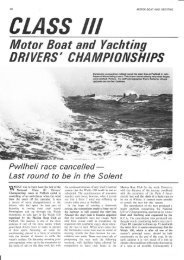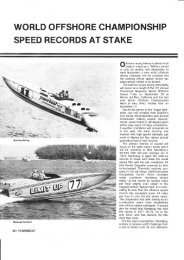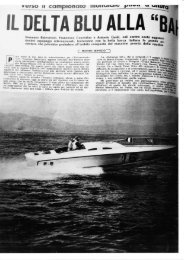S S - Powerboat Archive
S S - Powerboat Archive
S S - Powerboat Archive
Create successful ePaper yourself
Turn your PDF publications into a flip-book with our unique Google optimized e-Paper software.
__S<br />
S<br />
-I<br />
rF.t"<br />
"}t,,',,,:<br />
i, '
The Changing Faee of<br />
POWIRBOAT RAII].|G<br />
By<br />
JOHN CHITTY<br />
WHAT'S NEW PUSSYCAT?<br />
OFFSHORE POWERBOAT racing,<br />
in the form in which we recognise<br />
it today is, in Great Britain,<br />
approaching the end of its first<br />
decade. lt all started with the first<br />
Daily Express Race from Cowes to<br />
Torquay in 1961<br />
- considered a<br />
breath{aking project at the timewhich<br />
was followed the next year<br />
by a group of madcap marine<br />
traders -<br />
(the forerunners of<br />
U.K.O.B.A.) deciding to race their<br />
little outboard cockleshells f rom<br />
Putney to Calais and back again.<br />
These great "epics" of eight and<br />
nine years ago can now be placed<br />
into historical perspective by comparing<br />
them with the 1969 Daily<br />
Telegraph - BP R o u n d Britain<br />
<strong>Powerboat</strong> Race, which in turn, ten<br />
years from now, may have dwindled<br />
in importance by comparison<br />
with some even more ambitious<br />
events as yet unthought of.<br />
But it is not only the events<br />
which have "grown up". Boats,<br />
engines, rules and even the psychological<br />
make-up of the competitors<br />
themselves have all chanqed.<br />
sl-owly but inexorably during "the<br />
intervening years. Change doesn't<br />
necessarily mean improvement.<br />
Some changes have been for the<br />
better but there are oihers which,<br />
while it might be argued that they<br />
were inevitable, have detracted<br />
from the enjoyment and value of<br />
offshore racing. Typical of this kind<br />
of rather unsatisfactory development<br />
has been the alteration in<br />
attitude of the competitors. When a<br />
driver enters an offshore race he<br />
is really pitting himself against two<br />
opponents-the sea and the other<br />
competitors. In the early days the<br />
fight against the "cruel sea" was<br />
the big thing and almost all one<br />
asked was to be able to finish the<br />
race. lf one could also win a prize<br />
by beating the opposition this was<br />
glory indeed, but it was a secondary<br />
thought in most drivers' minds.<br />
Now, with the advent of faster<br />
boats and bigger engines, and<br />
w h e n "safety" dictates that an<br />
event shall be called off or put on<br />
a sheltered course if the sea even<br />
26<br />
Our trilby-hatted Lieut.-Commander sometimes affected a notty woolly pom-pom hat<br />
in,rtead !<br />
begins to look bad-tempered, the<br />
emphasis has swung in the opposite<br />
direction and "to win" is evervthing.<br />
lt can, of course, be argued<br />
that there is no ooint in racino if<br />
you do not want io win, but thi5 is<br />
too easy an answer. Offshore<br />
racing is more complex than that.<br />
It is rather like a combination of<br />
point-to-point racing and mountaineering.<br />
Of course the contestant is<br />
going to try to win (as in point-to<br />
point) but more than 50'l of his<br />
concentration must be on overcoming<br />
the hazards that nature has<br />
thrown in his way-the edges and<br />
ditches of the point-to-point course,<br />
and the ice-clad vertical faces of<br />
the mountain. To finish the course,<br />
or get to the top of the mountain,<br />
is an achievement in itself, quite<br />
unrelated to whether he arrives<br />
first, or last.<br />
THE CAUSE<br />
The change in attitude of the<br />
competitors is a "result", so let us<br />
take a look at the "cause". This is<br />
not far to seek and even a cursory<br />
glance will tell us that we are faced<br />
with a "chicken and egg" problem.<br />
In the process of becoming faster<br />
boats have become much less<br />
beamy, are lighter and carry less<br />
freeboard. In a nutshell, they are<br />
less seaworthy. Because the boats<br />
have become less seaworthy race<br />
organisers are more inclined to<br />
play safe and to cancel races (or<br />
use rough weather courses) when<br />
anything more than a Force 4<br />
starts to blow. Knowing that they<br />
will not be asked to go out in really<br />
rough conditions, competitors (and<br />
designers) feel safe in making<br />
their boats even faster and even<br />
more extreme, which in turn<br />
causes organiser to be even more<br />
cautious. And so it goes on. Of<br />
course, there is only one way to<br />
break the spiral and that is for<br />
clubs to take a much tougher line<br />
and not cancel races at the droo<br />
of a hat. A few rough and hairy<br />
rides will soon convince comoetitors<br />
that seaworthiness is more<br />
important than speed in an offshore<br />
boat.<br />
I should have altered the position<br />
of the question mark in the<br />
title of this article. lt should read<br />
"What's new? Pussycat!" because<br />
the current upsurge in interest in<br />
catamarans for offshore racing is a<br />
perfect example of the kind of<br />
development we have been discussing.<br />
A catamaran has many advantages<br />
on calm water but there<br />
cannot be a vessel much less<br />
suited to rough offshore work-as<br />
anyone will confirm who has tried<br />
driving a power cat. in a heavy<br />
beam sea. Offshore catamarans<br />
are not a new phenomenon. A<br />
number of well-known drivers, including<br />
Doug Norvall, Tommy Sopwith<br />
and Lady Aitken have iried<br />
racing cats. offshore over the past<br />
six or seven years, but without any<br />
conspicuous success. lt was not<br />
until 1969, when James Beard produced<br />
his stepped catamaran,<br />
Volare ll, that a twin - hulled<br />
machine has shown any sign of<br />
real I y consistent success-but<br />
weather-wise 1969 was an exceotionally<br />
favourable year. Nevertheless,<br />
the faint whiff of possible<br />
POWERBOAT
victories ahead has sent a larqe<br />
number of seasoned competito-rs<br />
scrambling on to the catamaran<br />
bandwaggon for 1970. Unless the<br />
coming season is another mild as<br />
milk affair I predict a lot of disappointment<br />
for these "cat lovers,,.<br />
Another aspect of development<br />
which is unwelcome (althouoh.<br />
again, probably inevitabie) is ihe<br />
loss of the old free-and-easv "fun"<br />
atmosphere that used to surround<br />
race meetings. As more races have<br />
been placed on the calendar, and<br />
more competitors have entered the<br />
lists, so the rules and red tape<br />
have proliferated and the attituije<br />
to racing has become more<br />
serious, more "professional", and<br />
more cut-throat. ldenticallv bonedomed<br />
competitors, having- waded<br />
through a plethora of rule books<br />
and paper work, line up wlth their<br />
boats, like soldiers on parade to<br />
be- inspected. The worried-looking<br />
officer of the day, providing he has<br />
extracted a guarantee of fair conditions<br />
from the met. office and<br />
assured himself that his safetv fleet<br />
is neatly placed around the c6urse,<br />
briefs the competitors and permits<br />
launching by numbers to begin.<br />
THE W]LL TO WIN<br />
When the flag goes down thirty or<br />
forty overpowered dart-like hulls<br />
shoot away from the line in the<br />
hands of grimacing, scowling competitors<br />
each fired with the "will to<br />
win" and the devil take the hindermost.<br />
Allowing for a little artistic<br />
exaggeration, such is the situation<br />
today-and it cannot but cause<br />
nostalgia to those who remember<br />
what it was like seven or eight<br />
years ago. Seaworthy production<br />
craft were the order of the dav<br />
-; -i"'l<br />
M,"s,,<br />
::; r "i '.;k<br />
One of the early offshore cotanlarans (1961). Bert Rouse,,standing (there was no redr<br />
seat), Doug Norvall and John Chitty. Not a ua:;h hat in.sight and life-jackets to<br />
wearer's choice !<br />
Photo: Mike Peter,y.<br />
."i:<br />
(anything over 30 m.p.h. was really<br />
fast!). and there was not a safetv<br />
boat or a crash helmet in sigh{.<br />
In fact I can remember one retired<br />
Lieut. Commander who always<br />
used to race in a trilby hat, and<br />
another couole who arrived at Putney<br />
at 5 a.m. one Sunday morning<br />
(prior to setting off to race to<br />
Calais) dressed as Edwardian<br />
minstrels-complete with muttonchoo<br />
whiskers. straw boaters and<br />
b a n j o s. Such lightheartedness<br />
would now be construed as illplaced<br />
levity not in keeping with<br />
a serious sport! In those years<br />
gone by competitors were responsible<br />
for their own safety (a<br />
responsibility which has subsequently,<br />
very mistakenly been usurped<br />
by "the establishment") and<br />
consequently were able to wear<br />
the lifejackets that they happened<br />
to trust and orefer. The rules-all<br />
of them-could be typed on one<br />
sheet of foolscap paper, and there<br />
was a "gentlemen's agreement"<br />
that a competitor would stop and<br />
help another in trouble. An officer<br />
of the day would have few qualms<br />
about starting even a Class lll<br />
event in Force 8 conditions, but he<br />
might caution his competitors to<br />
"stay in company, chaps, for the<br />
first 20 miles-until you come into<br />
the lee of such-and-such a headland-then<br />
you can have a dicel"<br />
An O.O.D. who gave such instruc-<br />
By 1967 the needle-nosed darts were in-and ge.tting more extretne.<br />
r !n*<br />
k*uri.F!l+,<br />
\qe$r.;s<br />
Jird-_.dfu<br />
- . **g:r t$<br />
ffi<br />
: li:!<br />
Iti<br />
:r lill q'n;;<br />
rs$,<br />
Fs* \<br />
' "*@*.;<br />
9.<br />
-*"<br />
FEBRUARY 1970<br />
FPtl\.11:9'.!:,<br />
27
The<br />
Changing<br />
Face of<br />
Fowerboat<br />
Racing - continued<br />
The 1961 winner of the Purney-Calais Rally, courtery flag aloft, glides into Calais<br />
harbour. A.similar craft totl.tty would t't
-.<br />
---i..T-r.fl4-_<br />
l'hil Mttull in hit<br />
ilt ltttrrtt, in ('lut.t lJ' .<br />
:;s. '<br />
*qr:'---.*<br />
iffiwr,-i,* %+*<br />
I'ht ttt t: M ikr P(ltt'r.<br />
-.t'<br />
_;y..1;*1<br />
rhl'e.<br />
-* .:* r-<br />
N


